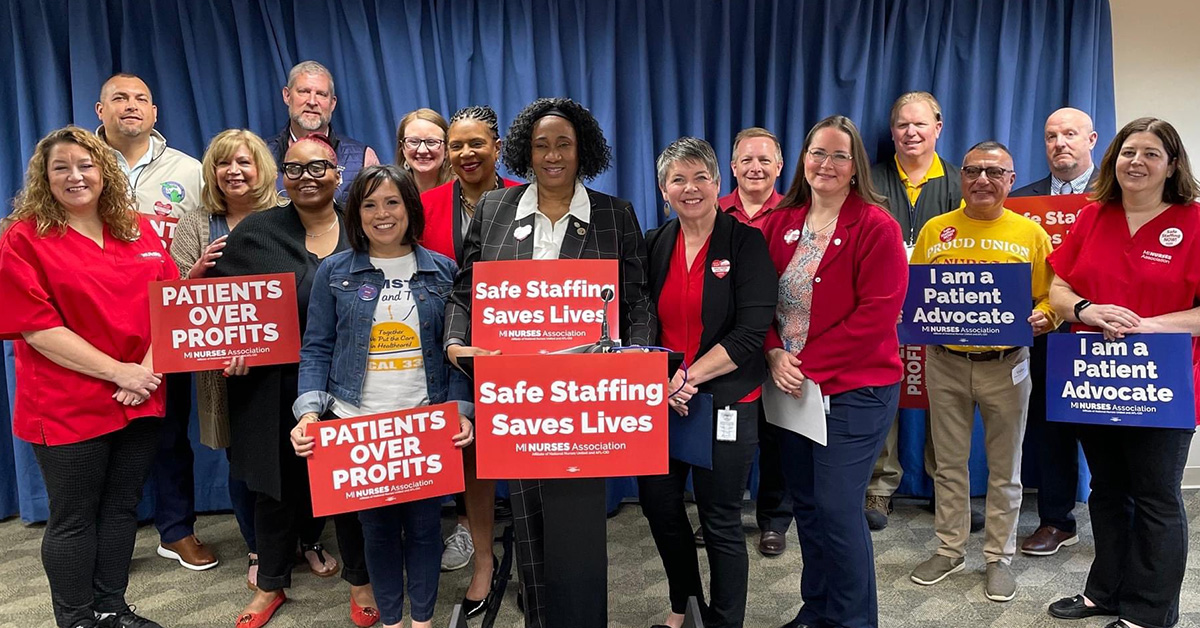Michigan legislators, RNs call for safe staffing limits

Staff report
National Nurse Magazine - July | August | September 2023 Issue
A legislative plan to set safe limits on the number of patients nurses can be assigned, curb excessive mandatory nurse overtime, and require hospitals to disclose their RN staffing has been introduced in both the Michigan state House and state Senate. The bills, known as the Safe Patient Care Act, aim to keep patients safe in Michigan hospitals and build and retain a strong nursing workforce.
“Health care is in crisis because of years of hospital understaffing. Every year, the situation gets worse. We have reached the point now where almost 40 percent of current nurses say that they are planning to leave within the next year,” said Jamie Brown, a critical care nurse and president of the Michigan Nurses Association. “Hospital executives have failed to fix the problem for over a decade. The only way to keep patients safe is through meaningful action that will hold corporate executives accountable.”
“We cannot keep asking nurses to do more with less. Nurses have repeatedly shared the exhaustion and moral fatigue they are experiencing,” said Rep. Betsy Coffia (D-Traverse City). “Research has shown that requiring nurses to work too many hours is both unsafe for patients and increases the likelihood of RNs leaving the profession entirely. It’s time to end this outdated and dangerous practice.”
A recently released survey of more than 9,000 Michigan nurses reveals the scope of the issues facing nurses and patients. The University of Michigan study published in a peer-reviewed journal indicates that:
- When mandatory overtime is frequently used, nurses are 72 percent more likely to have left the profession within the past two years.
- Nearly 40 percent of Michigan nurses say they plan to leave their job within the next year.
- 83 percent of currently practicing nurses say adequate staffing is their main concern.
“As a country, we have decided that for everyone’s safety there must be limits on the number of hours that pilots and truck drivers can be made to work in one day,” said Sen. Stephanie Chang (D-Detroit). “When patients’ lives are on the line, it’s just common sense that similar limitations be in place for RNs.”
An independent poll of Michigan nurses commissioned by the Michigan Nurses Association earlier this year found similar findings to University of Michigan’s survey of nurses. This poll, conducted by Emma White Research with a +/- 4.9 percent margin of error, found that:
- Over nine in ten RNs say requiring nurses to care for too many patients at once is affecting the quality of patient care.
- The number of nurses who say they know of a patient death due to nurses being assigned too many patients nearly doubled from 22 percent in 2016 to 42 percent this year.
- Three-quarters of nurses currently working in direct patient care say they would be more likely to stay if such legislation passes, while nearly four in 10 who have left say they would be more likely to come back.
The poll also showed that most RNs blame working conditions, not a shortage of qualified RNs, for the staffing crisis. Michigan Licensing and Regulatory Affairs (LARA) reported that there are 154,758 RNs with active Michigan licenses as of January. Yet only 102,480 people are employed as RNs in the state of Michigan, according to the U.S. Bureau of Labor Statistics.
“Bedside nurses, patients, and peer-reviewed research all agree: our health care system is in trouble and patients are dying. We cannot continue doing what we’ve been doing and expect different results,” said Rep. Stephanie Young (D-Detroit). “Michigan should lead the way by passing laws that establish minimum nurse-to-patient ratios. Patient safety and the overall health of our nurses must be prioritized and now is the time to do it.”